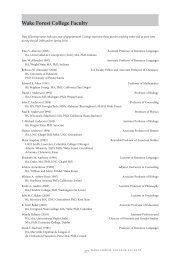theundergraduateschoo ls - Wake Forest University
theundergraduateschoo ls - Wake Forest University
theundergraduateschoo ls - Wake Forest University
Create successful ePaper yourself
Turn your PDF publications into a flip-book with our unique Google optimized e-Paper software.
oles, responsibilities, and expectations, and how these interact with related issues of class<br />
and race. (CD)<br />
333. Language and Gender. (3h) Uses an anthropological perspective to examine relationships<br />
between language structure, language use, persons, and social categories. A<strong>ls</strong>o listed as<br />
LIN 333.<br />
334. Peoples and Cultures of South Asia. (3h) Survey of the peoples and cultures of the Indian<br />
subcontinent in the countries of Afghanistan, Bangladesh, Bhutan, India, Nepal, Pakistan, and<br />
Sri Lanka. Reviews major topics of interest to anthropologists, including prehistory, history and<br />
politics, religion, social organization, caste, gender, development, and population. (CD)<br />
336. Myth, Ritual, and Symbolism. (3h) Explores how people envision and manipulate the supernatural<br />
in cross-cultural perspective. Emphasizes functional aspects of religious beliefs and<br />
practices. (CD) P—ANT 111 or 112 or 113 or 114, or POI.<br />
337. Economic Anthropology. (3h) Examines the relationship between culture and the economy<br />
and its implications for applied anthropology. The variable nature and meaning of economic<br />
behavior is examined in societies ranging from non-industrial to post-industrial. Discusses the<br />
impact of economic development programs, foreign aid and investment, technology transfer,<br />
and a variety of other economic aid programs. P—ANT 111 or 112 or 113 or 114, or POI.<br />
339. Culture and Nature. (3h) Exploration of humanity’s “place” in the cosmos, focusing on<br />
different worldviews of nature and culture. Case studies from anthropology, archeology, and<br />
environmental science examine conceptions of technology, resources, environment, and ownership<br />
in the context of environmental change, “natural” disasters, and resource scarcity.<br />
340. Anthropological Theory. (3h) Study and evaluation of the major anthropological theories of<br />
humans and society. The relevance and significance of these theories to modern anthropology<br />
are discussed. P—ANT 112 and 113 and 114, or POI.<br />
342. Applied Anthropology. (3h) Seminar exploring the ways anthropological concepts and data<br />
contribute to understanding and solving contemporary problems facing human populations<br />
everywhere. Emphasis is on change and conflict situations in developing areas, but problems<br />
encountered by urban and industrialized cultures a<strong>ls</strong>o are considered. P—ANT 111 or 114,<br />
or POI.<br />
353/354. Field Research. (3h, 3h) Issues-based field program provides students with a critical<br />
understanding of the historical, social, political-economic, and environmental conditions that<br />
have shaped the lives of the people of the Greater Southwest, with special attention to the Native<br />
American and Latino/a experience. The program moves from the Mexican border region<br />
through New Mexico and Arizona, focusing on border issues, archeology and prehispanic history,<br />
and contemporary Native American culture. Students camp, hike, and learn to use digital<br />
technology in the field. Specific sites may vary from year to year. P—POI.<br />
355. Language and Culture. (3h) Covers theoretical and methodological approaches to the study<br />
of language and culture, including: semiotics, structuralism, ethnoscience, the ethnography of<br />
communication, and sociolinguistics. Topics include: linguistic relativity; grammar and worldview;<br />
lexicon and thought; language use and social inequality; language and gender; and other<br />
areas. (CD)<br />
358. Native Peoples of North America. (3h) Ethnology and prehistory of the indigenous peoples<br />
and cultures of North America. (CD) P—ANT 111 or 112 or 113 or 114.<br />
A N T H R O P O L O G Y 74






